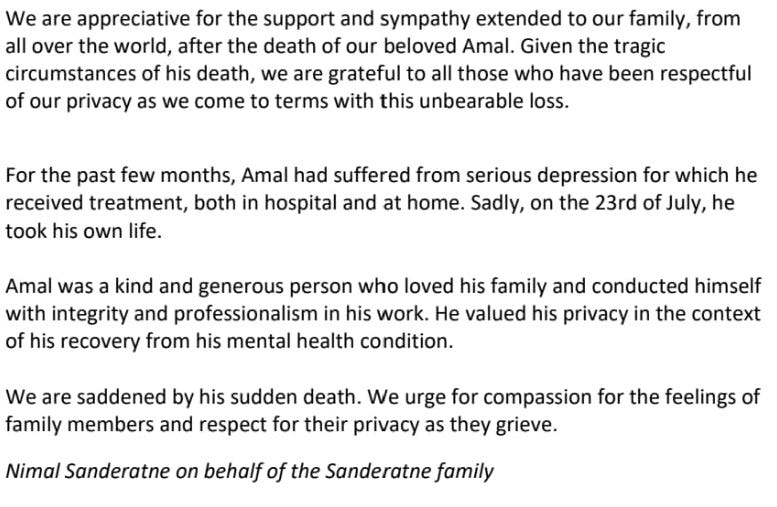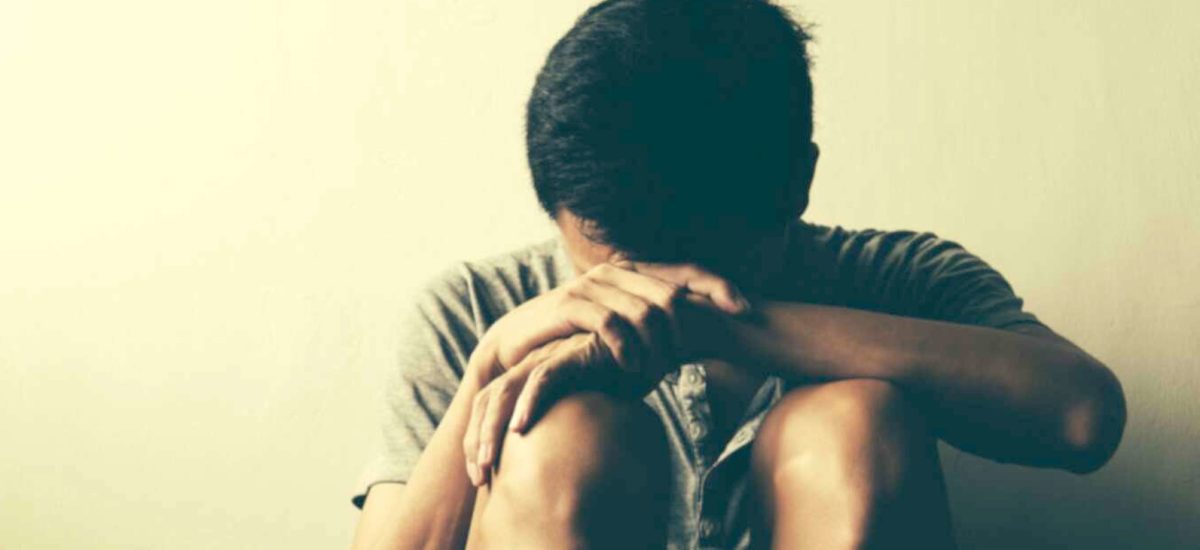Photo courtesy of IndiaSpend
The family of Amal Sanderatne shared a public message, which was courageous and honest in the context of the stigma that has cloaked the issue of mental health and suicidal ideation in Sri Lankan society.
This is the message they shared on social media:
 This clear statement and request for respect and privacy indicates boundaries that are not often accorded to the families of those of us in Sri Lanka who suffer from mental illness such as depression, or to the sufferers themselves who struggle to manage their condition amidst the challenges of everyday life and the responsibilities of professional work and social relationships.
This clear statement and request for respect and privacy indicates boundaries that are not often accorded to the families of those of us in Sri Lanka who suffer from mental illness such as depression, or to the sufferers themselves who struggle to manage their condition amidst the challenges of everyday life and the responsibilities of professional work and social relationships.
The societal shame often directed towards sufferers in our judgmental society also leads to them experiencing increasing social isolation rather than the support and understanding they need. Sri Lankan society, especially where men are concerned and dating back to historical, feudalistic sociocultural archetypes, is traditionally structured upon ideals of strength and heroism and courage and leadership which are the foundation of any patriarchal society.
And this leads to the valorising of sporting and military heroes and captains of industry and other strong male role models who we see daily in our advertising and our media and the resultant dismissal of men who are seen as vulnerable in any way, whether differently abled or not so visibly handicapped by mental health issues that restrict their demonstrable performance and productivity in life. Sensitive or artistic types or men whose psyche differ from the masculinist norm are often the target of mockery and bullying from school days, and this pain is internalized by them in the absence of access to knowledge or mental health tools that could help them process these experiences.
For many men, emotions such as sadness and grief are taboo. Emotions are a natural human phenomenon. Learning to deal with them is important for maintaining a sound mind. Instead, we teach men to suppress their emotions in an effort to be a patriarchal man who can only feel aggression. The celebration of figures like Andrew Tate as role models and “unapologetic role models of boldness and strength” adds further fuel to such fires.
According to WHO statistics of 2019, Sri Lanka recorded 2,285 instances of male suicide whereas the female suicides were at 692. Furthermore, the ensuing economic crisis has seen an upturn in male suicide rates in Sri Lanka.
The high suicide rates of men and boys exposes the suffering they experience in silence. This mental torment can be seen in the statistics that show how dysfunctional and destructive many men are in terms of the escalating cases of criminal violence, sexual assault, domestic and intimate partner violence and other kinds of socially damaging behaviour, which these numbers indicate; the majority of perpetrators are men and boys.
This could also be due to many people not being taught coping skills or building emotional resilience and so the way they deal with trauma or any kind of grief is to lash out with a strong sense that this is how a man should react to adversity – violently, aggressively, assertively, to dominate, overthrow and crush the opposition.
Psychologists, psychiatrists and mental health professionals who are trained in teaching these coping skills and how to manage emotional self-regulation are among the many professionals who are currently leaving the country. The professional support that is available is therefore unfortunately limited and patients are often kept waiting to meet the doctor of their choice, further adding to their stress and anxiety. There is an urgent and increasing need for psychologists and psychiatrists to be trained in Sri Lanka and to offer their services in ways that are accessible to patients. There is an important role that community awareness and the media can play to remedy the knowledge deficits in this area. People who speak up honestly about mental health issues, especially from their direct experience on social media should be applauded for their courage in opening up these matters for public discussion so the public can become aware of how serious they are.
Instead of facing their issues, escapism is the primary means by which people today are coping and this is seen often in socially normalised indulgence in vices which lead to more problems. Many men from all social classes are addicted to alcohol and there is no residential rehabilitation available for alcoholism, only counselling. Besides addiction to substances, many are also immersing themselves in their work or turning to distractions such as sex and pornography in order to temporarily cope with the pain or trauma they endure. These addictions are themselves symptoms of underlying problems and unless these core issues are addressed, the sufferer will continue to ricochet in their progress in life.
A post shared on social media after Amal Sanderatne’s recent passing advocated men to have a “good drink, get laid regularly, spend hours at the gym, foreign travel, etc”. While these activities are no doubt pleasurable, they are distractions that people use to temporarily escape dealing with their mental health issues, be it a mental illness or a traumatic or stressful situation. Many are hopelessly unaware of what their friends are going through and often advocate for such activities instead of encouraging their friends to actively seek professional help. Then, once their friend is no more, they write posts on social media along the lines of “we did not know, we would have helped you, why didn’t you reach out”.
This denial of the seriousness of the issue of mental health is also because, in Sri Lanka’s patriarchal society, the notion of a man going for psychological counselling or therapy is looked upon as the act of a weak man. The notion is that you are mentally ill only if you are weak, and that you seek help only if you are weak, a belief which is far from the truth. Actively taking care of your mental health and wellbeing, seeking professional help where required and admitting that you need it is one of the bravest and best things that a person can do. Because it is not about what others think, it is about how you are directly dealing with yourself and the management of your life.
Success in life is often determined externally by material achievements, amassing houses, cars and living a high end luxury lifestyle when in reality a content and stable mind is a stable source of happiness which is self-created and provides more lasting solace than any material asset can create. Unfortunately, in a materialistic society inundated with advertising the so called “good life”, we have forgotten to focus on what is within and instead often look to amass and acquire material assets and visible signs of success for validation, stability and happiness.
There is urgent need for widespread community education to de-stigmatise these issues and for our society as a whole to engage in the systematic building of accessible mental health resources that offer support to families and individuals challenged by mental health concerns as a pre-emptive measure, so that we are not made aware of issues facing our fellow citizens only after the fact of their passing.
The mainstream media, too, need to improve their reporting of incidents which open these issues to discussion since the way a person’s death is reported frames the speculation and passing of opinion that takes place on social media. Much of what is said and broadcast is hurtful to those who knew the person who has died or who may be struggling with their own mental health themselves and whose anxieties can be triggered by sensationalist or careless language used in these instances.
Ignorance is not a justifiable excuse. As the journalist Maryam Azwer recently commented on Twitter: “There are professional and ethical guidelines in place when reporting on suicide/attempted suicide/suspected suicide. A simple Google search will bring up a lot of resources, but touching on two basics: 1. Avoid reporting a death as suicide until it has been confirmed. 2. Be mindful of the language you are using (“died by suicide” as opposed to “committed suicide”).”
Empathy is important in dealing with these issues and understanding that mental illness is not something you can snap out of. It is a serious health condition that must be addressed with the right attitude, care and treatment in an ongoing and consistent way. Dismissing such matters as weak or unimportant is what is leading to the escalating suicide rates in Sri Lanka and it is unfortunately more the men in our society, trained as they are from their youth in a competitive and achievement-oriented setting to perform at their best every day, who are facing this issue.
These organisations can help and support those with mental health issues: http://cccfoundation.org.au/cccline/,https://www.ncmh.lk/, https://srilankasumithrayo.lk/ and https://cafs.lk/

